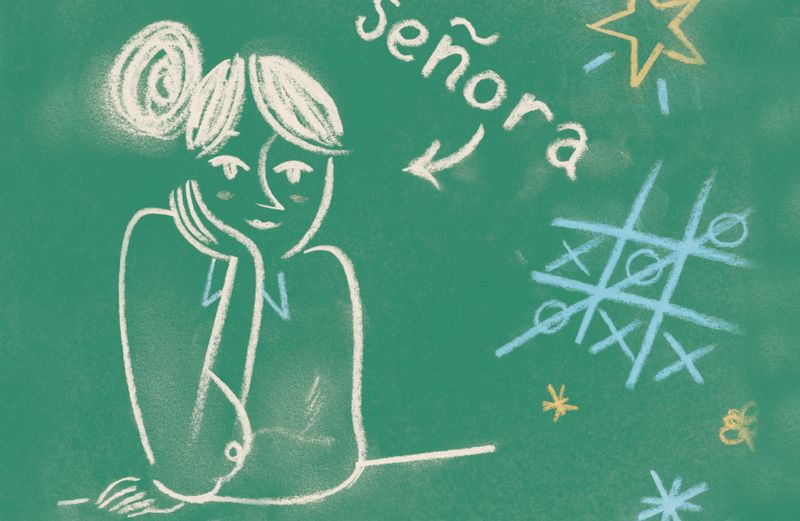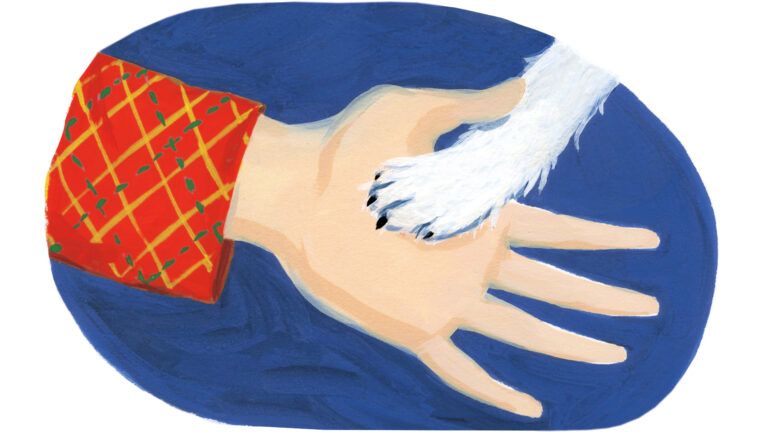Substitute. Every high school student knew what that meant: a chance to goof off until the “real” teacher came back. Not in my class, I thought as I prepared for my beginner Spanish students.
I was working a long-term job, filling in for a teacher on maternity leave until the New Year, and this class was my biggest challenge. I had years of full-time experience, lots of practice teaching language. Yet I couldn’t seem to get through to the kids in my third block.
The bell rang and the kids wandered in, still deep in the conversations they’d started at lunch. The first period after lunch was the worst time for concentration. “Settle down,” I said. They dropped into their seats. Right away their eyelids started to droop.
FOR MORE INSPIRING STORIES, SUBSCRIBE TO ANGELS ON EARTH!
“Don’t get too comfortable,” I said. “We’re going to do some trabalenguas—tongue twisters. That will improve your pronunciation.”
“But Señora Allen,” a lanky boy in the back row said. “We just had lunch. We need a siesta.”
“There’s always mañana for exercises,” his friend beside him agreed with a yawn.
We had the same argument every day. Teenagers just couldn’t digest their lunch and learn Spanish at the same time. “We need to wake you up,” I said. “Let’s sing a song.”
The class groaned. Their regular teacher relied more on the textbook, but I found art, music games and group activities much more effective. In my class we left our books closed and tried simple conversations. We played bingo with colors, days of the week or different foods. We sang songs in Spanish.
Usually all the activity kept the kids focused. But not in this class. When we finished our song, I turned to write on the board. Immediately I heard whispering and—even worse—the telltale rustling of paper that meant the kids were passing notes to each other instead of paying attention.
Cell phones had been banned from the classroom, thank goodness. But that didn’t stop kids from texting the old-fashioned way, on scraps of paper.
“I think we need to go over the rules of this class again,” I said sternly. As I listed them off on my fingers, the kids repeated them with me. “Pay attention to the lesson, only one person talks at a time, do your own work and no writing or passing notes in class!”
READ MORE: A HEAVENLY HIGHER EDUCATION
I spent the rest of the hour walking up and down the rows. The second I stopped moving the notewriting would start.
By the end of the class I was the one who needed a siesta. Sometimes teaching was like performing, and a difficult audience made it all that much harder. They weren’t bad kids, I knew. There were a lot of things contributing to their lack of attention.
It was a beginner class, so all the material was new. Some kids picked it up more quickly than others. Plus there was that after-lunch laziness. Add to that an unfamiliar teacher who did things a new way and these teenagers had almost too many reasons not to pay attention.
I’ve got until Christmas break to get through to them, I thought as I packed up my materials for the day. God, help me reach them!
I returned to school the next day determined to take control of the class. There were some bright spots. Some of the kids got really into a new word game. The next week I invented an exercise where students had to write about a random person cut out of a magazine.
What did the person like to do? What were his goals in life? Who were her friends and family? Everything could be written in the present tense to make it easier for beginners. That exercise yielded some great work.
Unfortunately, only a few of the students here and there seemed consistently interested. As great as it was to have a few of my students come in for tutoring, midway through December the class as a whole seemed just as disengaged as ever.
Maybe I’m just not a good enough teacher, I thought when I came into class the last day before Christmas break. I dreaded handing out our final test. My other classes had all gone pretty well, but the third block felt like a test I had already failed.
“Buenos días, Señora Allen,” a girl sang as she came into class. “I know today’s our final, but I think it would be more culturally correct if we had a siesta instead.”
That was one joke I never wanted to hear again. I passed out the tests with strict instructions. “Don’t look at anyone else’s work. If you finish before everyone else you must sit quietly. No talking while other students are working.”
The kids bent down over their tests. For a while the only sound was the scratching of pencils on paper. Then one by one students finished. To my right I heard the hiss of whispering voices. “Girls!” I said sharply. “No talking allowed during the test.”
The two culprits giggled and—what was that on the desk? A note! During the final! I really have failed. “Give me that note!” I snapped.
The girls looked down. “It isn’t a note,” one of them said.
“Well, whatever it is, put it away!” I said, completely out of patience.
When the bell rang the kids were glad to turn in their papers and go. The girls I had snapped at stayed behind when the others had filed out of the classroom. The girls dropped something on my desk. A note? “For you,” they said on their way out.
I eyed the note suspiciously. I had spent a whole semester trying to bring these kids in line. Who knew what it might say! I took a deep breath to center myself and read:
“Dear Señora Allen, Thank you so much for all that you have done. You are such a great teacher and third hour appreciates everything you’ve done for our class.
“All of your games and activities really helped us get a better understanding of the language, and we also appreciate all your patience and hard work. You’re an awesome sub! And we all hope you continue teaching. From, Your Third Hour.”
The note was signed by everyone in the class, from my early-morning tutoring students to the class clowns in the back. Sometimes we don’t know the progress we’re making. Until a class full of ángeles finds a way to get through to us.
Did you enjoy this story? Subscribe to Angels on Earth magazine.






